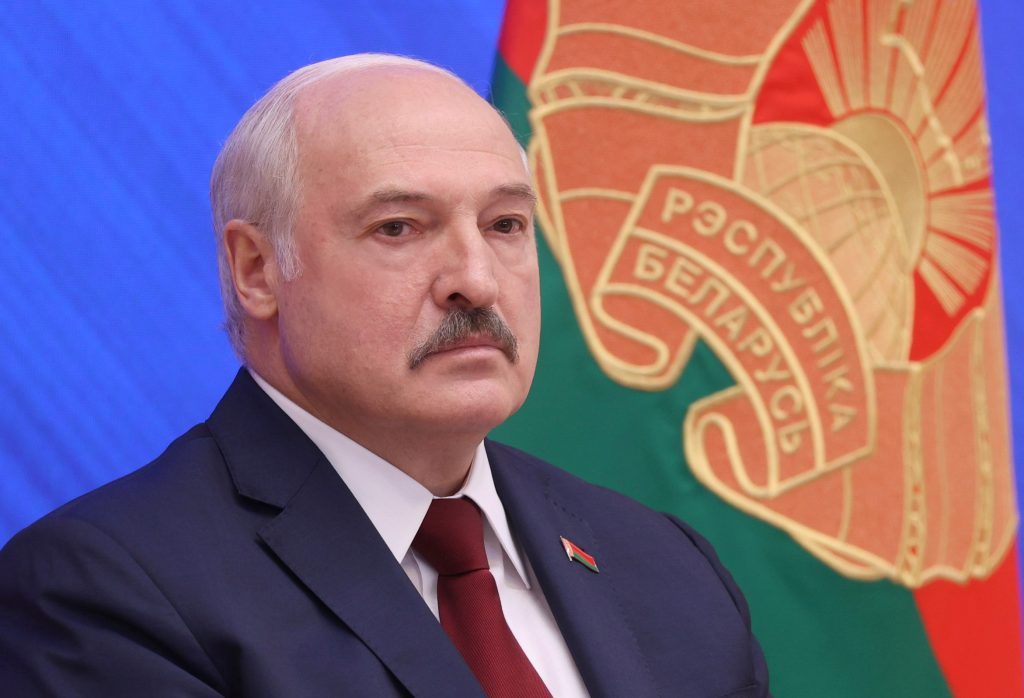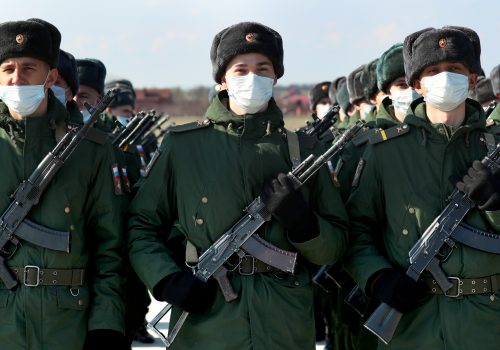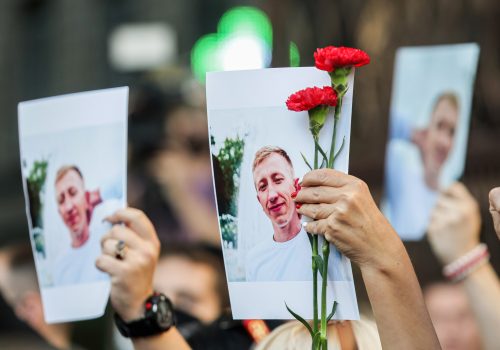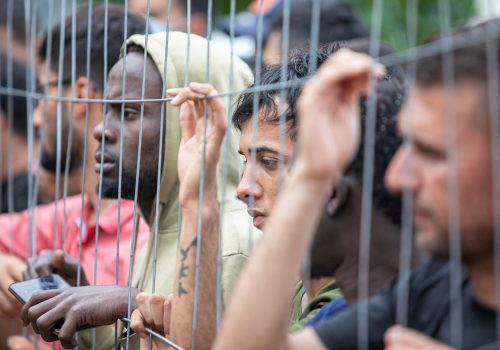Exactly one year after Belarus dictator Alyaksandr Lukashenka stole his country’s August 2020 presidential election, the US, UK, and EU imposed new sanctions on Lukashenka’s circle, related companies, and (in the case of the UK and EU) Belarusian sovereign debt. This was widely applauded as a welcome and coordinated response to Lukashenka’s lawless and aggressive behavior over the past twelve months, which has included the imprisonment and torture of opposition figures, the apparent murder of a dissident in Kyiv, the forcing down of a commercial passenger plane to arrest a dissident journalist, and much more.
But just two days later, the IMF allocated about USD 910 million to Belarus in Special Drawing Rights, which is not cash but can be converted into cash. The disbursement was long planned and went to all IMF members. It was not an IMF attempt to undercut sanctions. Nevertheless, the message was damaging.
News of the IMF disbursement generated concern within the Belarusian democratic opposition and among those who support its cause, including in the US Congress. Many have begun asking pointed questions about policy consistency. It doesn’t help that while the IMF’s SDR allocations were intended to support governments in dealing with the COVID pandemic, Lukashenka has been notorious in this area as well, earlier suggesting that a shot of vodka and a tractor ride are ideal ways to combat the global pandemic.
The IMF has long resisted imposing human rights conditionality on its members, but it does consider corruption and other issues related to a country’s ability to use IMF funds productively. Meanwhile, as the largest IMF stakeholder, the United States has for decades included issues of governance and the rule of law when considering IMF support, such as through standby agreements toward particular countries.
When challenged on the SDR allocation for Belarus, which is different to a conditional and negotiated standby agreement, Biden Administration officials have privately expressed sympathy for the cause of Belarusian democracy but have insisted that the problem of SDRs for the Lukashenka regime can only be resolved by withdrawing recognition.
Making the consistency problem worse, with US encouragement during the Trump Administration, the IMF did withhold assistance including SDRs destined for the Maduro regime in Venezuela, on the grounds that it is not clear whether Maduro was the legitimate leader of the country. The Venezuela and Belarus situations are not the same, of course, but they are close enough for the difference in approach to raise eyebrows.
If the Biden Administration regards democracy support as a pillar of its foreign policy, it needs to find a way to help the IMF approach to Belarus be reasonably consistent with the policies of the US, EU, UK, and other major IMF stakeholders. It may be tricky, but that’s why senior policy makers get big offices and titles.
First, the US and key allied governments can act on a coordinated basis to prevent Lukashenka from converting the SDRs into hard currency. This means no dollars, no pounds, no euros, and no yen for Lukashenka’s SDRs. Second, they can approach the Chinese and urge that Beijing do the same. These are the only currencies that SDRs can be converted into. The Chinese are unlikely to respond to appeals based on concerns about Lukashenka’s human rights record or even the alleged murder of dissidents abroad, but it is worth making the effort. IMF watchers tell me that China is not in the habit of trading SDRs for yuan. Besides, trading SDRs into yuan is not nearly as valuable for Lukashenka.
These steps may delay Lukashenka’s ability to use the SDRs. But the US and its allies could try to go further. The big step would be derecognition of the regime. That’s a high bar. Recognition is not a sign of approval but acknowledgment that a government is in fact in command of a sovereign country. Such a move would have costs, because Lukashenka would probably expel the remaining diplomats from any countries that derecognized. Even under adverse circumstances, it’s useful to have an on-the-ground presence inside. But, following the semi-precedent in Venezuela, it’s a step the US and its chief allies may want to take in response to more lawless behavior by the Belarus dictator.
Derecognition could be even more justified in the event of Lukashanka agreeing (or being forced by the Kremlin to agree) to consolidating his country’s “Union State” with Russia, effectively ending Belarusian sovereignty just thirty years after the end of the Soviet Union. A dictator acting to dissolve his own country’s sovereignty after forcing into exile the person seemingly elected president would seem a compelling case for derecognition.
Eurasia Center events

State union with Russia is a real possibility for Belarus. Putin is not adverse to annexing more territory, as the world has seen in his illegal attempted annexation of Ukraine’s Crimean peninsula. He seems to regard Belarus as part of greater Russia, and himself as a modern czar on a sacred mission to gather together what he sees as historic Russian lands.
For years, Lukashenka presented himself to the West as a strongman ruler who was nevertheless a defender of Belarusian sovereignty in the face of Kremlin ambitions. That pose, however sincere it may have been in the past, is now entirely hollow as the Belarus dictator is almost entirely dependent on Putin’s support.
The thirtieth anniversary of the fall of the Soviet Union is coming up at the end of this year. Putin, often seeking nationalist triumphs to burnish his otherwise sagging domestic credentials in the face of Russia’s stagnating economy and oligarchic corruption, may be tempted to mark it by completing the stealth takeover of Belarus. Unofficially annexing an entire country would mark a new stage in Putin’s aggressive and revisionist foreign policy.
Led by the US, the IMF’s major democratic stakeholders should find ways to avoid perceptions that the financial institution is propping up Lukashenka, and should take care to avoid anything that looks like a subsidy for new Kremlin territorial claims in Europe. Before it is too late, the IMF, with US and other key IMF member support, should make clear that its recognition of Lukashenka hangs by a thread, and that it cannot disburse the SDRs without assurances that there will still be an independent Belarus to receive them.
The IMF doesn’t make these decisions entirely on its own. It is a multilateral organization and consults with its membership. The US, European governments, the UK, and other democratic allies hold a lot of IMF shares. They should make clear that SDR disbursement is conditional on assurances of Belarus’s continued sovereignty, and that the disbursement ought to be held up until these assurances are received in a form that the IMF and major stakeholders find credible.
It is not easy dealing with a wily dictator backed by an even more powerful authoritarian ally. The IMF, and the democratic stakeholders who created it in the first place, need to work together on the challenging issue of Belarus. Derecognition of Lukashenka’s regime would be a big step for the IMF, despite the semi-precedent of Venezuela. To achieve this, the US would have to push hard in concert with key allies. But the IMF probably doesn’t want to be propping up tyrants and can work with its major stakeholders to do the right thing.
Daniel Fried is the Weiser Family distinguished fellow at the Atlantic Council. He was the coordinator for sanctions policy during the Obama Administration, assistant secretary of State for Europe and Eurasia during the Bush Administration, and senior director at the National Security Council for the Clinton and Bush administrations. He also served as US Ambassador to Poland during the Clinton Administration. Follow him on Twitter @AmbDanFried.
Further reading
The views expressed in UkraineAlert are solely those of the authors and do not necessarily reflect the views of the Atlantic Council, its staff, or its supporters.

The Eurasia Center’s mission is to enhance transatlantic cooperation in promoting stability, democratic values and prosperity in Eurasia, from Eastern Europe and Turkey in the West to the Caucasus, Russia and Central Asia in the East.
Follow us on social media
and support our work
Image: Kremlin-backed Belarus dictator Alyaksandr Lukashenka has been hit by sanctions over his brutal crackdown on pro-democracy protests. (Pavel Orlovsky/BelTA via REUTERS)





